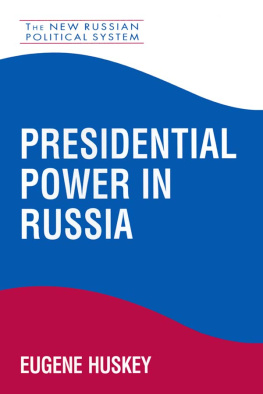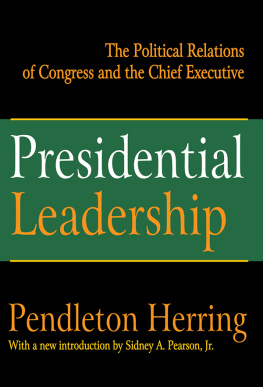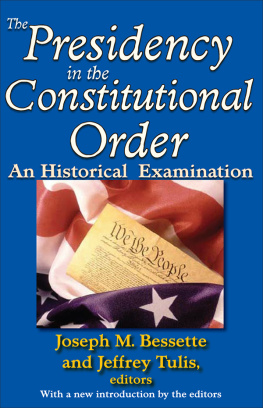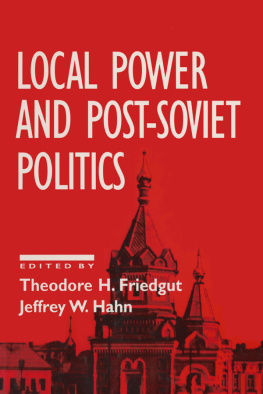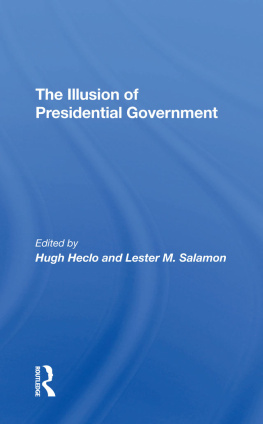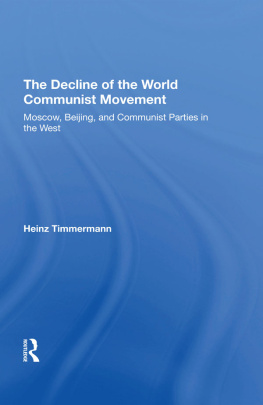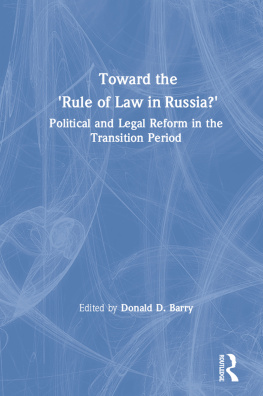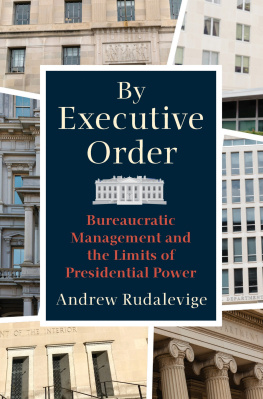EXECUTIVE POWER AND SOVIET POLITICS
Contemporary Soviet/Post-Soviet Politics
PERESTROIKA-ERA POLITICS
THE NEW SOVIET LEGISLATURE AND GORBACHEV'S POLITICAL REFORMS
Robert T. Huber and Donald R. Kelley, eds.
SOVIET CONSTITUTIONAL CRISIS
FROM DE-STALINIZATION TO DISINTEGRATION
Robert Sharlet
EXECUTIVE POWER AND SOVIET POLITICS
THE RISE AND FALL OF THE SOVIET STATE
Eugene Huskey, editor
CRACKS IN THE MONOLITH
PARTY POWER IN THE BREZHNEV ERA
James R. Millar, ed.
CRIME AND PUNISHMENT IN SOVIET OFFICIALDOM
COMBATING CORRUPTION IN THE SOVIET ELITE, 1965-1990
William Clark
Executive Power and Soviet Politics
The Rise and Decline of the Soviet State
Edited by Eugene Huskey
First published 1992 by M.E. Sharpe
Published 2015 by Routledge
2 Park Square, Milton Park, Abingdon, Oxon OX14 4RN
711 Third Avenue, New York, NY 10017, USA
Routledge is an imprint of the Taylor & Francis Group, an informa business
Copyright 1992 Taylor & Francis. All rights reserved.
No part of this book may be reprinted or reproduced or utilised in any form or by any electronic, mechanical, or other means, now known or hereafter invented, including photocopying and recording, or in any information storage or retrieval system, without permission in writing from the publishers.
Notices
No responsibility is assumed by the publisher for any injury and/or damage to persons or property as a matter of products liability, negligence or otherwise, or from any use of operation of any methods, products, instructions or ideas contained in the material herein.
Practitioners and researchers must always rely on their own experience and knowledge in evaluating and using any information, methods, compounds, or experiments described herein. In using such information or methods they should be mindful of their own safety and the safety of others, including parties for whom they have a professional responsibility.
Product or corporate names may be trademarks or registered trademarks, and are used only for identification and explanation without intent to infringe.
Library of Congress Cataloging-in-Publication Data
Executive power and Soviet politics:
the rise and fall of the Soviet state/
Eugene Huskey, editor
p. cm. (Contemporary Soviet/post Soviet politics)
Includes bibliographical references and index.
ISBN 1-56324-059-9 (cloth)
ISBN 1-56324-060-2 (pbk.)
1. Executive powerSoviet Union.
2. Soviet UnionPolitics and government19451991.
I. Huskey, Eugene, 1952
II. Series.
JN6540.E94 1992
354.4703'22dc20
92-8452CIP
ISBN 13: 9781563240607 (pbk)
ISBN 13: 9781563240591 (hbk)
Contents
Eugene Huskey |
T.H. Rigby |
Cameron Ross |
Eugene Huskey |
Brenda L. Horrigan and Theodore Karasik |
Peter B.Maggs |
Stephen Fortescue |
Barbara Ann Chotiner |
Ellen Jones and James Brusstar |
Louise Shelley |
The Administration of Justice:
Courts, Procuracy, and Ministry of Justice
Eugene Huskey |
Eugene Huskey |
Like other projects conceived at the end of the Soviet era, this book had a long and difficult gestation. Its appearance is a tribute to the patience and flexibility of the contributors, whose topics underwent a dizzying transformation in the final months of 1991.
In editing and preparing the manuscript for publication, I was assisted at Stetson University by the staff of the DuPont-Ball Library and by Michael Connelly, Don Gast, Kim Simonds, and Judy Usher in the Department of Political Science. It is a pleasure to acknowledge their work. I am also grateful to the Knight Foundation and the Jessie Ball duPont Fund for financial support.
DeLand, Florida
May 1992
Note on Transliteration and Usage. The transliteration system used here is that of the Library of Congress. Exceptions to that system have been made in the case of surnames widely used in the Western press (thus, Yeltsin rather than El'tsin). The term 'government' has several meanings in English. Government is capitalized here when it refers to the institution ( pravitel'stvo, Sovet ministrov, Kabinet ministrov ) that sits atop the state's executive agencies.
Eugene Huskey
By the summer of 1991, Gorbachev's policies of glasnost' and demokratizatsiia had fundamentally transformed the central institutions of the Communist Party and the Soviet legislative system. But the central executive institutions of state, known collectively as the Government ( pravitel'stvo ), remained largely unreconstructed. The Government's vast network of ministries and state committees, which had always functioned as the institutional core of the Soviet political and economic system, continued to employ the population, to administer the economy and society, and to function as a key source of information and influence in the shaping of policy. The reforms of the Gorbachev era revealed that remaking the party's "power over words" was easier than remaking the Government's "power over things."
The Government became, in effect, the last line of defense against a new order. In August 1991, leading members of the Government launched a coup to reassert executive authority amid the decline of the Communist Party and the rise of social movements and independent-minded legislatures. Although support for the coup came from conservative elements in party and legislative bodies as well as officials in the machinery of Government, it was the Government's Cabinet of Ministers that served as the coup's "general staff." Ranking members of the Government emerged as the central figures in the short-lived junta, the State Committee for Extraordinary Events. Standing behind the junta's constitutional prop, Vice-President Gennadii Yanaev, were the prime minister, Valentin Pavlov, the minister of defense, Dmitrii Yazov, the minister of internal affairs (MVD), Boris Pugo, and the head of the Committee on State Security (KGB), Vladimir Kriuchkov. The failure of the coup crippled the Government's economic and repressive institutions, which had given cohesion to the Soviet Union. Without respected or effective institutions of state in the center, the Union soon became ungovernable, and, in December 1991, 11 of the former republics of the USSR regrouped into a loose confederation known as the Commonwealth of Independent States. For the moment, the Commonwealth has eschewed the formation of its own Government, leaving the development of state executive institutions to the constituent states.
The August 1991 coup is only the latest illustration of the centrality of the Government to an understanding of Soviet politics and society. Yet the scholarly literature (and much journalism) on the Soviet Union in the last quarter century has neglected the state's executive institutions, leaving a legacy focused on the party, parliament, and political movements to the virtual exclusion of what in American political science would be called public administration. How does one make sense of the neglect of the Government in such a state-centered political system? Three explanations seem to be in order.


